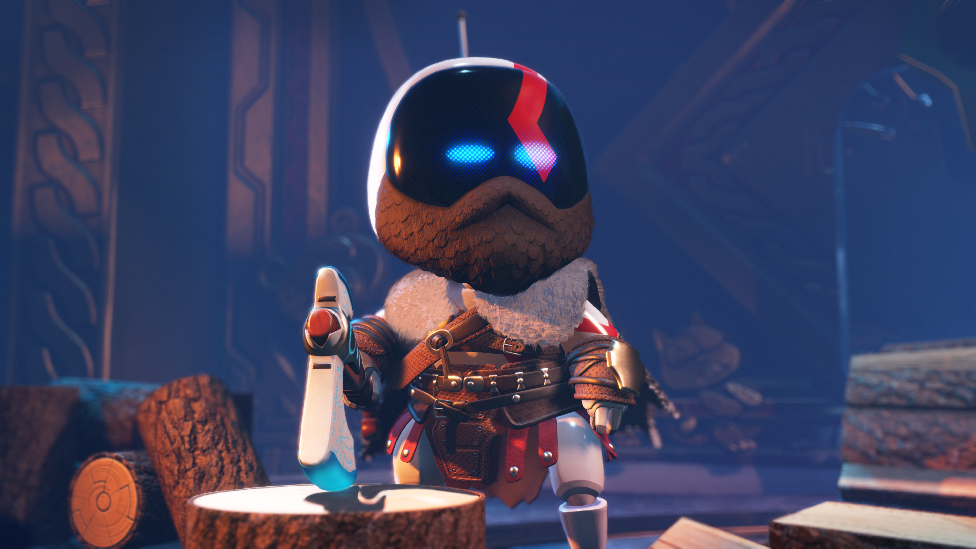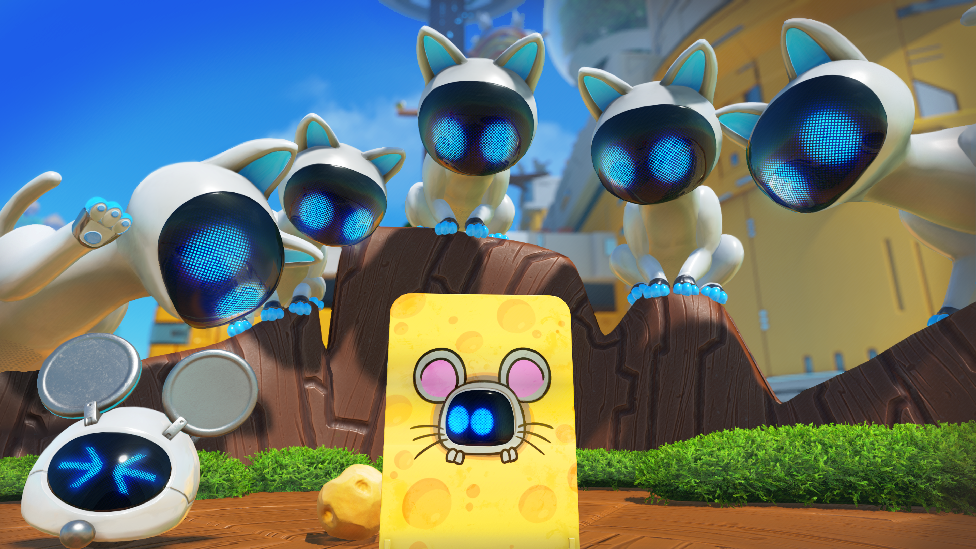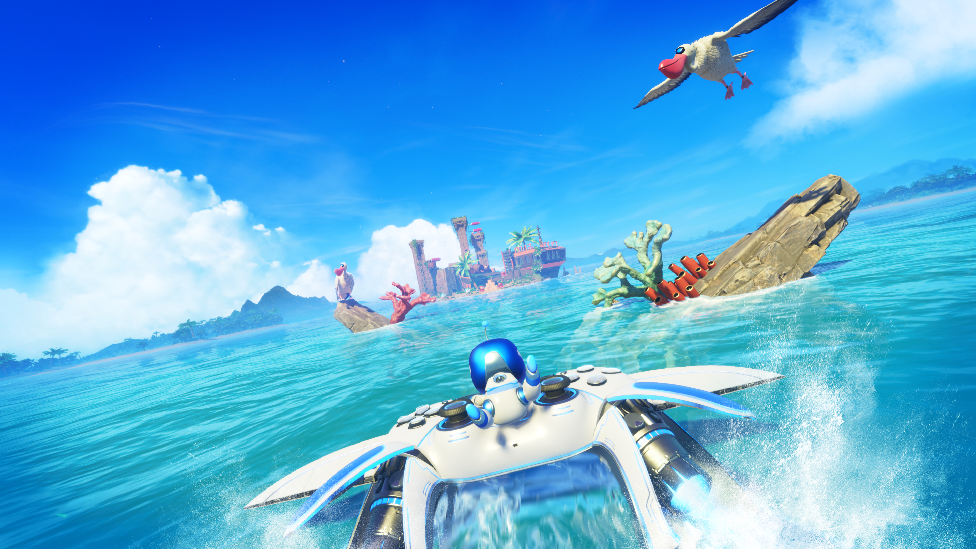Astro Bot: Could the old-school hit reshape PS5's future?

Bot the difference: Astro Bot features dozens of cameos from well-known PlayStation characters
- Published
It's just a few hours before reviews of one of the year's biggest PlayStation 5 releases arrive, and its director is talking about food.
Buffets, to be precise.
You might get a lot for your money, but how do you feel afterwards?
"Bloated, you've eaten too much and you just want to go and sleep," says Nicolas Doucet, head of Sony-owned studio Team Asobi.
Gamers are fond of food metaphors. Developers don't just make games, they "cook". If you're spoilt for choice with high quality new releases, you're "eatin' good".
But Nicolas is referring to the sense that blockbuster publishers have tended to have an all-you-can-eat approach when it comes to making games.
For a while now, the industry's biggest players have been focused on producing open-world titles offering dozens of hours of gameplay, or on attempts to muscle into the lucrative online market.
Both genres have produced some huge hits, but Nicolas wonders if there is an appetite for something more like "that two-course meal that is going to be just the right amount".
Astro Bot could be just the recipe Sony has been looking for.
Earlier this week the Japanese company announced it was pulling Concord - one of its other recent big games - from sale after a tepid response from critics and players.
The online shooter is the latest high-profile bid to corner the so-called "live service" market dominated by the likes of Fortnite and Apex Legends that's failed to attract a large audience.
But in a quiet year for first-party PlayStation releases, Astro Bot has received some of the highest review scores of 2024 and some critics say it’s one of Sony’s best in ages.
At its heart it's an old-school 3D platformer that's crammed full of references to PlayStation's 30-year history.
The game's main objective is to rescue 300 Astro Bots hidden around various themed levels, with about half of those decked out in cosplay to resemble characters from the console's past.
But as much as it's a nostalgic reminder of Sony's great successes, could it also be a lesson for the company's future?

Catstro Bot: Astro Bot picks up powers throughout the game that allow it to change size, shape and, in one case, species
If you're one of the world’s 60 million PlayStation 5 owners, you're almost certainly familiar with Astro Bot.
The cute mascot character appeared in 2020's Astro’s Playroom, a short, three-hour adventure pre-installed on every machine.
It was designed to act as a tech demo for the hardware and its advanced controller, but people loved it.
"And it did highlight perhaps the fact that people are craving for these kind of games," says Nicolas.
Releasing a 3D platformer in 2024 is, on paper, a daunting prospect. Nicolas admits the genre - a staple of the PlayStation 2 era - isn't very common these days.
And, he says: "The ones that do exist are very, very high quality from people who've been making them for years and years."
It's also a genre Sony has moved away from recently, and its biggest releases have been more adult, cinematic titles such as God of War and The Last of Us.
Nicolas thinks this is a sign of audiences, and the developers making games for them, maturing.
But he admits that left a gap which Team Asobi - a relatively young studio - was eager to fill.
"I think there needs to be more games that are there just to relax, have a little bit of fun, that are not dramatic, that are not necessarily heavily story driven, where you can just mess around with a game and it's fun," says Nicolas.
"But, of course, it needs to be executed well."
Astro Bot's been widely praised for its polish, attention to detail and the way it plays, drawing comparisons with Mario - for many, the undisputed king of 3D platformers.
Nicolas considers descriptions of Astro Bot as "old school" a compliment and that going "back to basics" helped with the game's development.
As concerns grow over spiralling budgets, Astro Bot was made in three-and-a-half years by a team of about 65 people - a relatively short time and small staff by modern standards.
Nicolas says the game's bite-sized nature - it's divided across 50 short, playable stages - helped to simplify development and made it easier to "swap things around".
"Whereas when you're tied to something that is one storyline, one timeline that is set, it's very difficult," he says.
"You have less flexibility."

The PS5's DualSense controller is a key part of the Astro Bot experience, throbbing and humming as players jet into a new level
Sony will now be hoping that Astro Bot's glowing reception translates into big sales, but comparisons with Concord's swift fall have already begun.
It's also shone a light on characters Sony could revive, and prompted some people to question whether the company will shift its recent focus on the live-service market.
Under previous PlayStation boss Jim Ryan, the company announced plans to launch 12 online-focused games. It’s since scaled that back to six.
As for single-player titles, some of Sony's biggest in-house studios haven't yet revealed PS5 projects.
Hermen Hulst, one of two new CEOs in charge of Sony’s gaming division, told the BBC in a statement it was "very important we offer a wide variety of titles to our community" and that "Astro Bot fills an important part of our portfolio".
He praised Team Asobi for creating "something special that is light-hearted and delightful" with "incredibly fun gameplay".
Astro Bot is also "a great opportunity for families to game together", he said.
Star Wars Outlaws maker defends glitches in 'complex' game
- Published29 August 2024
Esports champ wants to get into real world of motorsport
- Published28 August 2024
Seven things we learned from Gamescom opening night
- Published21 August 2024
Nicolas opts not to comment on the Concord situation or bigger, strategic moves, but he does agree with his boss that Astro Bot has given PS5 a game that can "bridge generations".
Many reviewers have remarked on how cameos from the past have reminded them of growing up with Crash Bandicoot, Jak and Daxter or the cast of Ape Escape - characters that set them on the path to becoming gamers.
Nicolas says he often gets messages from parents who've played Astro's Playroom with their children talking about their experiences, and he hopes that the new game will create more shared moments.
"I'm really happy that, besides the game itself, there's a greater good, if you like, that we're able to tell stories like that," he says.
"And I really hope that we can brighten some people's homes thanks to that experience."
Additional reporting by Tom Gerken.
